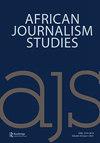赞比亚媒体监管的历史性;审查拟议的法律自律
IF 1.1
3区 文学
Q3 COMMUNICATION
引用次数: 5
摘要
摘要自20世纪90年代初赞比亚恢复民主治理以来,赞比亚媒体一直处于不确定状态。尽管奇卢巴总统政府于20世纪90年代中期开始承诺采取初步措施解除对媒体的管制,但事实证明,连续几年实现这些目标是困难的。历届政府对自由和独立的媒体越来越反感,反而加大了监管力度。这一点意义重大,因为与卡翁达1991年之前的独裁时代相比,国家对媒体更加友好,无视规范理论。2000年代中后期,赞比亚媒体道德委员会和赞比亚媒体道德理事会(ZAMEC)作为自律机制都失败了,目前国家的努力转向创建一个混合的法定自律框架。这是一个挑战,因为赞比亚的民主受到越来越多的政治不容忍的压力。此外,尽管媒体专业人士支持监管以加强专业精神的想法,但他们往往对法定自律的价值及其影响意见不一。这项研究采用了对23名媒体专业人士的深入采访方法和文献分析,勾勒出赞比亚媒体监管工作的历史和未来影响。结果显示了一个曲折的过去,但现在是一个更加复杂的未来。独立广播管理局的历史表明,拟议的法定自律框架给媒体带来了前所未有的挑战。本文旨在为全球媒体研究,特别是非洲背景下的监管、国家和媒体自由问题做出贡献。本文章由计算机程序翻译,如有差异,请以英文原文为准。
The Historicity of Media Regulation in Zambia; Examining the Proposed Statutory Self-Regulation
ABSTRACT The media in Zambia have been in a state of uncertainty since Zambia reinstated democratic governance in the early 1990s. Despite promising initial steps to deregulate the media that started under President Chiluba’s government in the mid-1990s, achieving these objectives in successive years has proved difficult. Successive governments have exhibited increasing aversion towards free and independent media, instead increasing efforts to regulate. This is significant, because comparisons with Kaunda’s autocratic era before 1991 cast the state in a friendlier light towards the media, defying normative theories. After both the Media Ethics Council of Zambia and Zambia Media Ethics Council (ZAMEC) failed as self-regulatory mechanisms in the mid to late 2000s, current state efforts have turned to create a hybrid statutory self-regulatory framework. This is a challenge because Zambia’s democracy has come under pressure from increasing political intolerance. Furthermore, while media professionals support the idea of regulation to strengthen professionalism, they often disagree on the value of statutory self-regulation and its implications. This study used the In-Depth Interview approach on 23 media professionals and documentary analysis to sketch the history and future implications of media regulation efforts in Zambia. Results show a checkered past but present an even more complicated future. The history of the Independent Broadcasting Authority shows that the proposed statutory self-regulatory framework presents more challenges to the media than ever before. This paper aims to contribute to global media studies and specifically the problems of regulation, the state, and media freedom in an African context.
求助全文
通过发布文献求助,成功后即可免费获取论文全文。
去求助
来源期刊

African Journalism Studies
COMMUNICATION-
CiteScore
1.90
自引率
10.00%
发文量
18
期刊介绍:
Accredited by the South African Department of Higher Education and Training for university research purposes African Journalism Studies subscribes to the Code of Best Practice for Peer Reviewed Scholarly Journals of the Academy of Science of South Africa. African Journalism Studies ( AJS) aims to contribute to the ongoing extension of the theories, methodologies and empirical data to under-researched areas of knowledge production, through its emphasis on African journalism studies within a broader, comparative perspective of the Global South. AJS strives for theoretical diversity and methodological inclusivity, by developing theoretical approaches and making critical interventions in global scholarly debates. The journal''s comparative and interdisciplinary approach is informed by the related fields of cultural and media studies, communication studies, African studies, politics, and sociology. The field of journalism studies is understood broadly, as including the practices, norms, value systems, frameworks of representation, audiences, platforms, industries, theories and power relations that relate to the production, consumption and study of journalism. A wide definition of journalism is used, which extends beyond news and current affairs to include digital and social media, documentary film and narrative non-fiction.
 求助内容:
求助内容: 应助结果提醒方式:
应助结果提醒方式:


